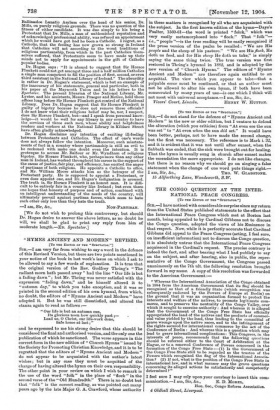Sra,—I am very far from wishing to say a word
in the defence of this Revised Version, but there are two points mentioned in
your notice of the book in last week's issue on which I ask to be allowed to say a few words of explanation. It is true that the original version of the Rev. Godfrey Thring's " The radiant morn hath passed away " had the line " Our life is but a fading dawn " ; but Mr. Thring was never satisfied with the expression "fading dawn," and he himself altered it to "autumn day," to which you take exception, and it was so printed in the second edition of his own hymnal, from which, no doubt, the editors of "Hymns Ancient and Modern" have
adopted it. But he was still dissatisfied, and altered the stanza again to read, as follows :-
" Our life is but an autumn sun,
Its glorious noon how quickly past ;— Lead us, 0 Christ, our life-work done, Safe home at last ;"
and he expressed to me his strong desire that this should be considered the final and authorised version, and the only one the publication of which he sanctioned. The verse appears in this correct form in the new edition of " Church Hymns " issued by the Society for Promoting Christian Knowledge, and it is to be regretted that the editors of " Hymns Ancient and Modern " do not appear to be acquainted with the author's latest wishes ; but in any case they must be acquitted of the Charge of having altered the hymn on their own responsibility.
The other point in your review on which I wish to remark is the use of the word "folk" in the place of "flock" in the second verse of the " Old Hundredth." There is no doubt but that " folk " is the correct reading, as was pointed out many years ago by the late Major G. A. Crawford, whose authority
in these matters is recognised by all who are acquainted with the subject. In the first known edition of the hymn—Daye's Psalter, 1560-61—the word is printed " folck," which was very easily metamorphosed into " flock." That " folk "- i.e., people "—is the true reading will be easily recognised if the prose version of the psalm be recalled : " We are His people and the sheep of his pasture." " We are His flock, He Both us feed, and for His sheep He cloth us take," is simply saying the same thing twice. The true version was first restored in Thring's hymnal in 1882, and is adopted by the new version of " Church Hymns." The editors of " Hymns Ancient and Modern" are therefore again entitled to an acquittal. The view which you appear to take—that a palpable error must be continued, or that an author must not be allowed to alter his own hymn, if . both have been consecrated by many years of use—is one which I think will not meet with universal acceptance.—I am, Sir, &c., Vicars' Court, Lincoln. HENRY W. HUTTON.










































 Previous page
Previous page